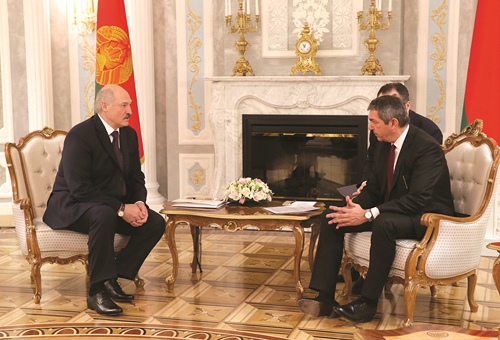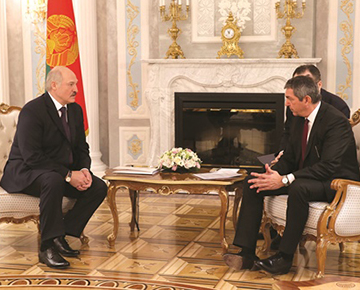EU Special Representative for Human Rights, Stavros Lambrinidis, arrives in Minsk on working visit and meets President of Belarus

Alexander Lukashenko and Stavros Lambrinidis during their meeting
The visit was both expected and logical, since relations between Belarus and European structures have revived significantly of late, covering such issues as visa simplification, minimisation of trade barriers and the return of Belarus’ special guest status on the Council of Europe Parliamentary Assembly.
Of course, some disagreements remain, since these can hardly be eliminated overnight. However, there has been constructive and substantial dialogue, rather than confrontation and mutual criticism, as was apparent at the meeting between the President and the European politician.
Back in 2012, the EU approved a plan of action in the sphere of human rights and democracy. At that time, the position of the EU Special Representative for Human Rights was established, occupied by the former Foreign Affairs Minister of Greece, Stavros Lambrinidis (in the photo). His task has been, primarily, to set up contacts and promote dialogue with countries, and with international and non-governmental organisations, in the sphere of human rights.
Of course, each state has its own position, which must be taken into account in giving advice (let alone conditions and ultimatums). We must listen to one other, as Mr. Lukashenko asserts. He laments that Minsk and Brussels have long needed trustworthy contacts and systematic dialogue. Now, it appears that we have the perfect opportunity to settle disagreements, elaborating mutually acceptable solutions.
Regarding human rights (economic and psychological, within a cultural and historical context), it would be wrong to act without due consideration. Mr. Lukashenko explains that he isn’t criticising the EU but that, Belarus, as a sovereign state, has its own clear position. The President states plainly, saying that solutions to humanitarian problems directly depend on the economic situation.
Human rights are not decided during street demonstrations. Housing, employment, education and healthcare are vital. In this respect, the development of trade-economic relations with the EU has far reaching consequences.
We may assume that Brussels’ understanding of our position is improving. Mr. Lambrinidis views the recent lifting of EU sanctions from Belarus as a good opportunity to expand interaction across all areas. We must now wait for concrete actions to follow.
By Yevgeny Kononov
Word-for-word
Alexander Lukashenko, President of Belarus
I’m glad that we’ve defined our way and that the European Union has too; we’ve moved from head-on confrontation and welcome Europe’s assessment of Belarus. We can now set up normal trade-economic and investment co-operation. I’m confident that this will inevitably lead to serious improvements across other areas.











